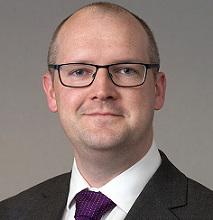Jim McDonnell - IP & Technology lawyer at DLA Piper - on the challenges of intellectual property
What is your background with DLA Piper?
I am well into my second decade with the firm, having trained here back when the firm was much smaller than it is now. Throughout that time, I have hugely enjoyed the culture. There are great people in all of the offices, and some of the most down-to-earth lawyers you will find. I mostly spread my time across the Manchester and Sheffield offices, occasionally in Liverpool and work very closely with my colleagues from the UK and international IP team and other departments across all of the offices.
What was it that first interested you about intellectual property?
Two things: Despite some half-hearted efforts I was never going to make it as a rock star, but writing music led me into thinking about things like copyright. Then, whilst studying for my degree, I was introduced to a brilliant lecturer who led the IP course at my University (she later went on to become dean of the faculty). She gave me a research project on plant variety rights. At the time I thought it was a fairly niche area - and I still do - but it piqued my curiosity. It led me into a whole range of things which I had never considered before, but which I came across on a daily basis: brands, new technologies, innovative designs.
And what do you enjoy about working in IP now?
As a technology lawyer, it is a real thrill to work with some of the UK's and the world's leading businesses at the cutting edge of research. Some of the new technology which has surfaced in my short career as a lawyer so far has been mind blowing; from the elegant simplicity of a warehouse racking guard to the unimaginable vision of breeding mice capable of generating human-compatible antibodies.
From the perspective of a solicitor in a large business law firm, working in IP allows such a great variety of work, and every bit of that variety helps to strengthen every other bit. Like many IP lawyers, I work on both transactional matters and disputes. Having dealt with IP transactions such as R&D collaborations and cross-border licensing, it helps to give some background and context when disputes arise; advising on disputes in turn helps identify what to look out for when advising on the early stages of the IP life-cycle and IP audits; and that in turn helps to inform what is needed when thinking about registrations and transactions, and so it goes on.
What do you see as the challenges currently in IP?
Like many things, IP is becoming increasingly internationalised. The things which are protected by IP rights are usually intangible (unlike your home or your car), and so they generally tend to ignore national borders. IP rights themselves have to follow suit and are becoming more harmonised on a regional and global level - for example, the Community trade mark and the Community design offer massive savings for businesses operating across Europe - but there is still some way to go.
For many businesses, there is simply the challenge of being aware of your own, and others', IP rights. There are many businesses that simply don't realise the value of what they have until someone else steps on their turf. That is where IP audits and good advice before developing new areas becomes so vital.
What's the next big thing for IP?
Without a doubt, the big change coming up in Europe is the EU Unitary Patent and the Unified Patent Court. This is perhaps the biggest game-changer in the history of European patents, and could well have an even greater impact than Community trademarks.
As things currently stand, inventors can apply for patents in each country, or to save a bit of cost they can make a single application through the European Patent Office, although that still results in a bundle of national patents. In either case, each national patent must be enforced or knocked out in its own country, meaning it is just too expensive to run an infringement claim across the whole of Europe.
With the Unitary Patent, applicants will be able to obtain a single patent registration which applies throughout the whole of the EU (except Spain and Italy, which have opted out). Perhaps more importantly, the Unified Patent Court will allow patent holders to take patent court proceedings with pan European effect. It will apply to Unitary Patents as well as patents granted by the European Patent Office, and will have key court venues in the UK, France and Germany. There are a few things that still need to be ironed out in the rules, and some things which patent-holders need to think about in advance, but it looks as if the UPC is due to arrive in 2017 - no doubt an exciting time for all IP practitioners!









